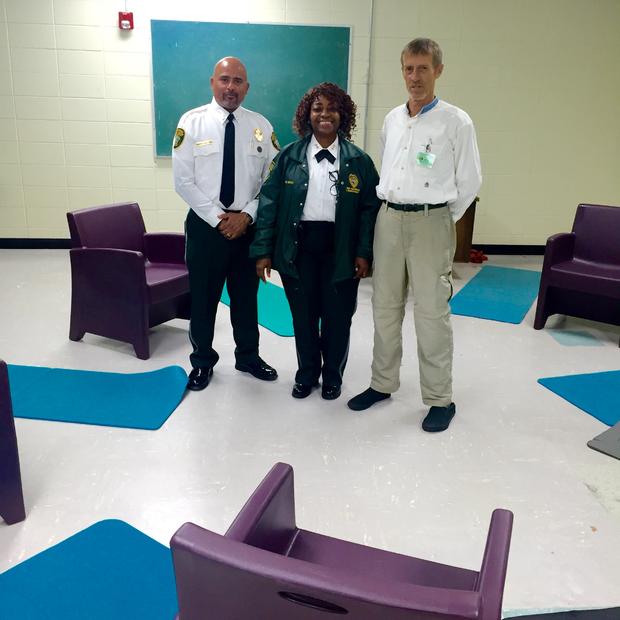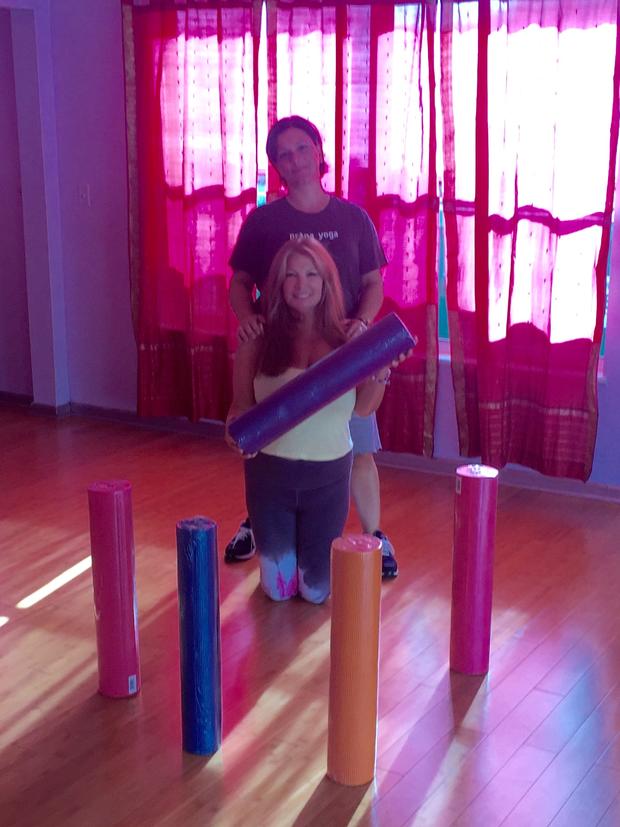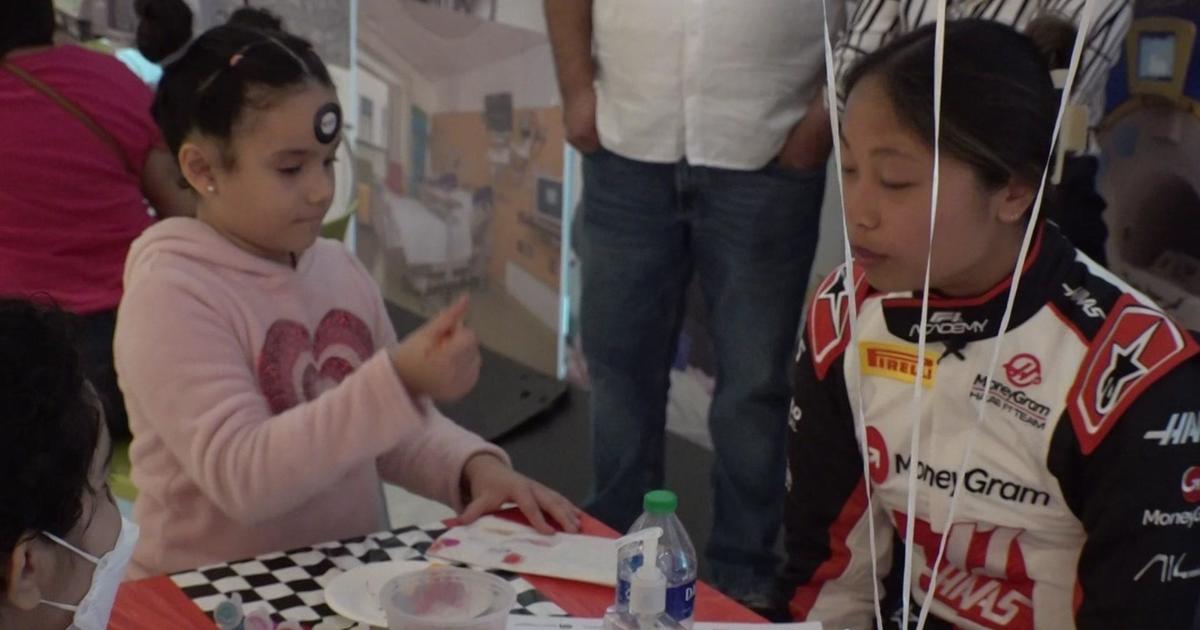The Forgotten Floor: A New Chapter
Follow CBSMIAMI.COM: Facebook | Twitter
MIAMI (CBSMiami) -- August 2016 will mark ten years since CBS4 news cameras first exclusively entered the so-called "forgotten floor."
It was the first of multiple visits CBS4 Chief Investigative Reporter Michele Gillen made to the 9th floor of the Miami-Dade Pre-Trial Detention Center that captured the shocking conditions and treatment afforded the most vulnerable of mentally ill inmates. Public outrage followed but change was painfully and for some inmates, perilously slow. However, now a decade later, many of the advocates, community and judicial leaders who worked so hard for change, say it appears it is a new day in Miami-Dade County for mentally ill inmates in its jail. They say lessons learned from the 9th floor and the CBS4 multi-part investigative series The Forgotten Floor have materialized and more.
In a sea of orange jumpsuits, gently, they are guided to glide into yoga positions. They quietly move in unison and close their eyes as they engage in a slow dance of deep breaths. It is a yoga and meditation class similar to many that unfold across South Florida. But this day, as on every Wednesday, the students are inmates who suffer from mental illnesses and who gather in a circle in a large day room at the Turner Gilford Knight Correctional Center.
The teacher, whose words they hang on and whose instructions they follow, is Lawrence Huff. A veteran instructor of yoga and mindful meditation, he embraces the challenge and opportunity of helping inmates behind bars- particularly those with mental illness - find tools that can assist them during imprisonment and after.
"I see them all as souls. Just like me. Just like you. They just had some bad strokes of luck. So they ended up this way," shares Huff who delights in helping the inmates find a way to tap into an inner calmness and confidence that can last beyond the one hour class.
"I try to recognize each one and help them. To give them a little encouragement when they do it well," says Huff.
The image of yoga and meditation lessons in a Miami-Dade jail is a most dramatic departure from how mentally ill inmates were once housed and treated on the notorious "Forgotten Floor" of the Miami-Dade Pre-Trial Detention Center. On what became known nationally as the infamous '9th floor' there were three, four, even five inmates holed up, often naked and forced to sleep on the floor in freezing, putrid-smelling cells designed for just one. As CBS4's Chief Investigative Reporter Michele Gillen would walk through the unit, inmates tried to share their messages with her.
"You can't treat human beings like this," said one young man, his expressive hands extended through the open food slat of a peeling stainless steel door.
In another cell, a prisoner, naked under a tattered and dirty Ferguson gown, worn to protect inmates at risk of suicide, yelled to Gillen, alarmed over his cell mate.
"He's drinking toilet water. There is no running water," he explained, pointing to a paper drinking cup on the edge of the steel toilet. Indeed on that unforgettable visit, there was, no running water in the inmate cells.
CBS4 News had stepped into a jail that had morphed into the largest de facto psychiatric ward in the state, with just one psychiatrist on staff, which which shocked our community and the nation, sharing with Gillen his perspective when she interviewed him a decade ago.
"You would think that in 2006 we would treat people better. This is stepping back into the 1600's. This is just barbaric, medieval treatment of the mentally ill. It's unbelievable. It is morally reprehensible," says a worried Dr. Joseph Portier.
In the 18 months since the Forgotten Floor was ultimately shuttered, a new generation of inmates are now housed in a two and a half million dollar retro fit of the 4th floor -- the Turner Gilford Knight Correctional Center. Miami-Dade Judge Steve Leifman, who first turned to Gillen to capture the reality of the 9th Floor, says it's a literal world away from the nightmare that for years remained largely a secret.
"I mean, your first Forgotten Floor led to a grand jury report. It was an eye opener to the entire community. It was a window for what needed to be done," shared Leifman as he toured the 4th Floor of TGK with Gillen and Miami-Dade Commissioner Sally Heyman.
"We can't thank you enough. It was impetus to get change going and look at how incredible the change is," says Heyman who, following the CBS 4 investigative series, never stopped championing for change and, on this visit, delighted in what a difference this new chapter was making for inmates in the South Florida community and potentially for prisoners around the nation.
"You brought it to light. It was beyond a hometown horror. And what you have now is all about possibilities and that has become a national model," says Heyman, who worked intimately and relentlessly on improvements, says Leifman. And there are many.
For starters, every corrections officer assigned to work at the jail with inmates who suffer from mental illness have received crisis intervention training. In fact, they are given a raise to work on this floor.
"And as a result we now have the largest crisis intervention team, CIT program in the United States. We have the most sophisticated post arrest diversion program in the United States. And it is changing and people are recovering," says Leifman.
And the lone psychiatrist? What a difference a decade makes.
"It is night and day. You have 13 psychiatrists working on these floors now. People are getting attention. They are not stuck in there basically 24 hours a day, 7 days a week," the judge added.
"In this case people are actually getting treated. They have therapy classes. They see one on one doctors. And therapists. You saw they have an outdoor area. The guy was playing basketball. It's an open space. It does not smell. It is not freezing. The water fountains work. People are getting the food and water they need. Its the way it is supposed to be."
Psychiatrist Patricia Junquera of the Jackson Health Services team also met with Gillen.
"I see them as patients no matter where they are. Individuals that are suffering from mental illness and that we have to take care of them as a whole. Medical, emotional well-being. And achieve an equilibrium. And that's where these programs come in and that is great," she shared just before observing the inmates in their yoga class.
Back on the 4th floor, corrections officers are proud to explain and show off how all systems are now automated -- electronic checks and balances. The distribution of medications, meals, visits by doctors and correctional staff, including suicide watch, are logged and tracked on tablets.
"We wanted to make this environment as safe and humane as possible," says Interim Director Miami-Dade Corrections and Rehabilitation Daniel Junior. "Any one of these inmates could be a member of our family or a friend."
Junior, a 20-year veteran of the Department of Corrections, smiles as he walks through one of six retro-fitted units surrounded by staff that seem relaxed and proud. Many are faces Gillen recognizes from the 9th Floor. The difference in this housing unit is palpable and visible. As pointed out by Junior, the goal of improvements was to make it more appropriate for this population and make it humane.
"As you can see we have done a lot of upgrades to these rooms that are totally different and advance in the right direction from what you remember from the 9th floor," he said.
"You can see every room is equipped with a suicide resistant bed. And a mattress. We installed mirrors in each one of those so we can have total visibility."
In the CBS4 series of reports, Gillen exposed how on the 9th floor neither corrections nor medical staff could call out directly to 911 when an inmate suffered a medical emergency. Life and death minutes could be lost in a maze of re-directing phone calls.
But now?
"If I needed to call 911, can I dial that directly," Gillen asks Junior.
"You can dial 911 directly from any unit within our system," he says. "And yes, that is a very big difference."
And getting help to injured inmates should be night and day, according to Heyman.
"There are medical people right on staff in here. It is no longer wait and delay and transport," she pointed out.
Fixtures have also been changed. For the acute mentally-ill, there are no more bunk beds from which an inmate, like William Weaver Jr., could jump from. Weaver ended up a quadriplegic and later died. His father met with Gillen and asked, "I wonder if anything is ever going to change? Is anything going to change? What is it going to take for something to change? I don't think it ever will."
Leifman says he never forgot that father's haunting sadness and disappointment.
"Mr. Weaver said I don't think it will ever change. And he starts to cry. Well, things do change. And we closed the 9th floor," Lefiman says. "There is no reason to accept things when people are getting hurt or killed. You can just feel the environment is just different than anything we had seen in the past."
After years of pushing for change, and a price paid by inmates of the 9th floor, Leifman says he will never forget the past.
"When you used to leave the 9th floor, what emotion did you have with you," Gillen asked.
"It was depressing. It was like, how do we treat human beings this way? But I think you need to take a lot of credit and should be incredibly proud for what you have just saw. I mean, Michele Gillen and CBS4 have made a remarkable difference. Not just in the lives of these individuals and not just in getting them in a better place that they should be, but in helping change the entire system."
"You made them human again. And it helped destigmatize the problem. And everyone is working on the same page in this county to do the right thing. And what is it doing? It is saving the taxpayers money, it's improving the public safety because people are not re-offending, and it's helping people with mental illnesses get into recovery, get their lives back and have hope and opportunity. You can not ask for anything better. This is how it always should have been done. And this is what we are trying to get the whole country to understand and it is starting to happen as well."
And on this day, female inmates were all smiles upon receiving brand new yoga mats as they headed into their class. Told the rainbow of mats they gleefully selected from were donated specifically to them by Prana Yoga and members of the South Florida yoga community, there was a round of saying thank you. Like their male counterparts, while they are living behind bars and coping with mental health issues and live in anonymity, it appears these days, they seem quite aware they are not forgotten.
"It is a new day. It is a new day for Miami-Dade County and how we deal with the mentally ill," says Director Junior as he wrapped up his interview with Gillen and headed to a cell to speak directly with one of the inmates.
"Tell me about your case..." he began.





